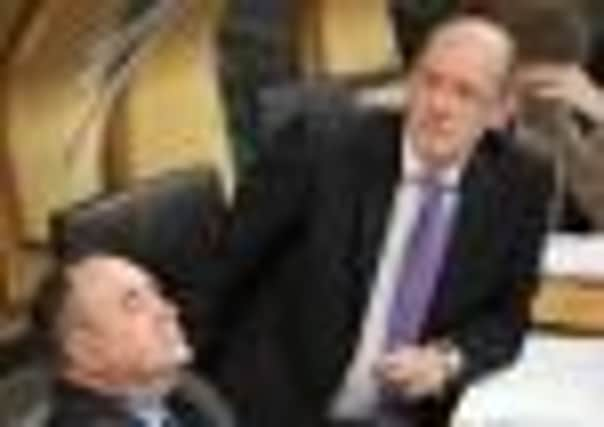Families’ water bills to rise as John Swinney unveils budget


Budget key points:
• £40m funding for affordable housing
• £80m for schools building programme
• Public sector pay freeze to end in 2013-14
• 1% pay rise for lowest paid public sector workers
• £30m for green energy projects
• £2.5m for hybrid buses
• £17m for colleges and student support
• Employer recruitment initiative for young people
• £6m for cycling infrastructure
• £1.5m for VisitScotland tourism marketing
• £1m to maintain historic buildings
• Creation of an Energy Skills Academy
The finance secretary said the economic conditions facing Scotland were the most challenging since devolution as he outlined his Draft Budget for 2013-14.
Mr Swinney made a series of mostly low-key announcements, which only amounted to £180 million of an overall budget of £28.4 billion. After announcing his plans at Holyrood, Mr Swinney said that, confronted with Westminster cuts, he had “looked for every available device I have to try and put investment into the economy”.
Advertisement
Hide AdAdvertisement
Hide AdBusiness leaders, however, claimed the finance secretary had missed an opportunity to reform public services and opposition politicians said he had “passed the buck” to Westminster.
At the heart of Mr Swinney’s budget were plans to spend £40m on affordable housing plus £80m on accelerating the school building programme. Mr Swinney said the number of schools being built will increase from 55 to 67.
In an attempt to create 10,000 private sector jobs for young people, the Scottish Government has promised £15m that would be matched by European Structural Funds. Employers too would be asked to make a contribution towards salaries of young employees. There are also plans for a new energy skills academy for those joining the jobs market.
A green package would see £30m used for a energy efficiency programme that will tackle fuel poverty and provide opportunities for small and medium-sized construction firms, – an initiative that will raise the spectre of more wind farms.
Following criticism of the SNP for neglecting Scotland’s further education institutions, Mr Swinney announced £17m for college education and student support.
To help finance these measures, the finance secretary said the Scottish Government would reduce its lending to Scottish Water by £45m in 2013-14.
The government insisted that the changes to Scottish Water’s borrowing would not have a detrimental effect on services or the utility’s capital programme.
But Mr Swinney did admit that water charges, which have been frozen, would rise for the first time in four years – going up in line with inflation. For those living in houses worth more than £212,000, their water bills are likely to increase by around £24.
Advertisement
Hide AdAdvertisement
Hide AdOther revenue streams would come from the release of £20m from the contingency budget of the Forth Replacement Crossing.
A further £28m will be deployed over the next two years as a result of Business Stream, the arm of Scottish Water that provides commercial water services, repaying a loan to the government. Another £40m cash will come from underspends in last year’s budget. Further savings have been delivered by the Scottish Futures Trust.
Mr Swinney said the Scottish settlement received in the UK Spending Review was the toughest since devolution. Between 2010-11 and 2014-15, the budget was suffering a real terms cut of 11 per cent.
“This is my toughest year,” Mr Swinney said. “£28.6 [billion in 2012-13] goes down to £28.4 [billion], so it is the toughest of the three years in the spending review.”
The government renewed its commitment to its high-profile and expensive policies such as free prescriptions, protection of the health budget, free university tuition, concessionary bus travel and the council tax freeze. Mr Swinney transferred £954.7m from the local government budget to justice, to pay for the new single police authority and £27.8m was taken to pay for the new centralised fire service.
The modest nature of the budget saw the government forced to trumpet a series of relatively low-cost measures such as £1m boost for historic buildings and £2.5m for hybrid buses.
David Lonsdale, assistant director of CBI Scotland, said: “This was a missed opportunity to signal a fresh direction on public service reform, through contracting-out the delivery of a far wider range of public services to the private sector.”
Labour’s finance spokesman Ken Macintosh said Mr Swinney was guilty of passing the buck to Westminster adding: “The unfortunate result of this Budget is likely to be the loss of more public sector jobs, but with very little to kick start the Scottish economy.”